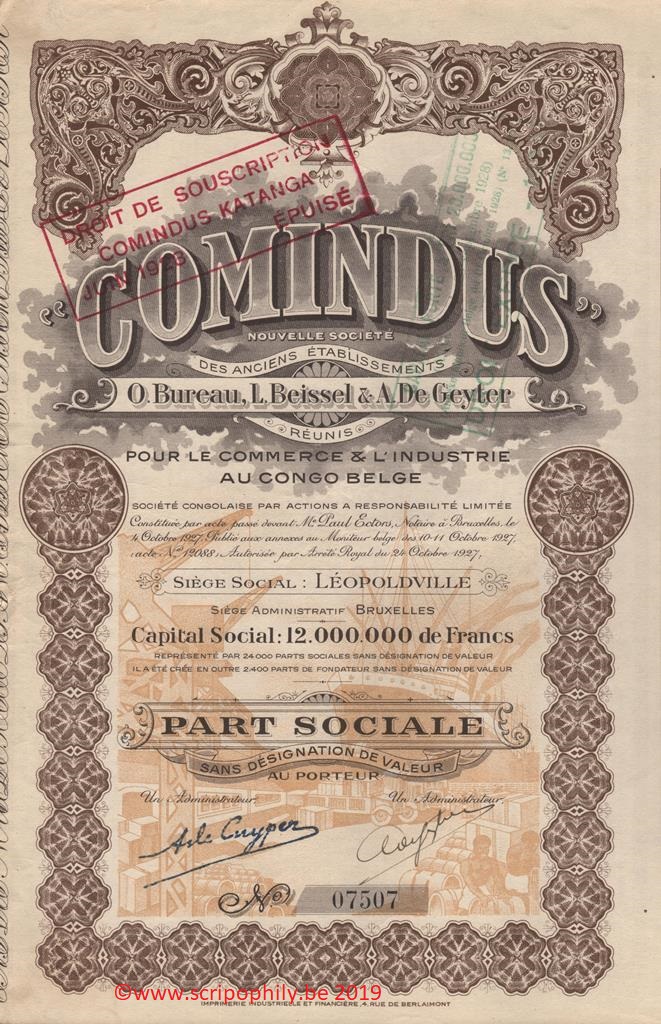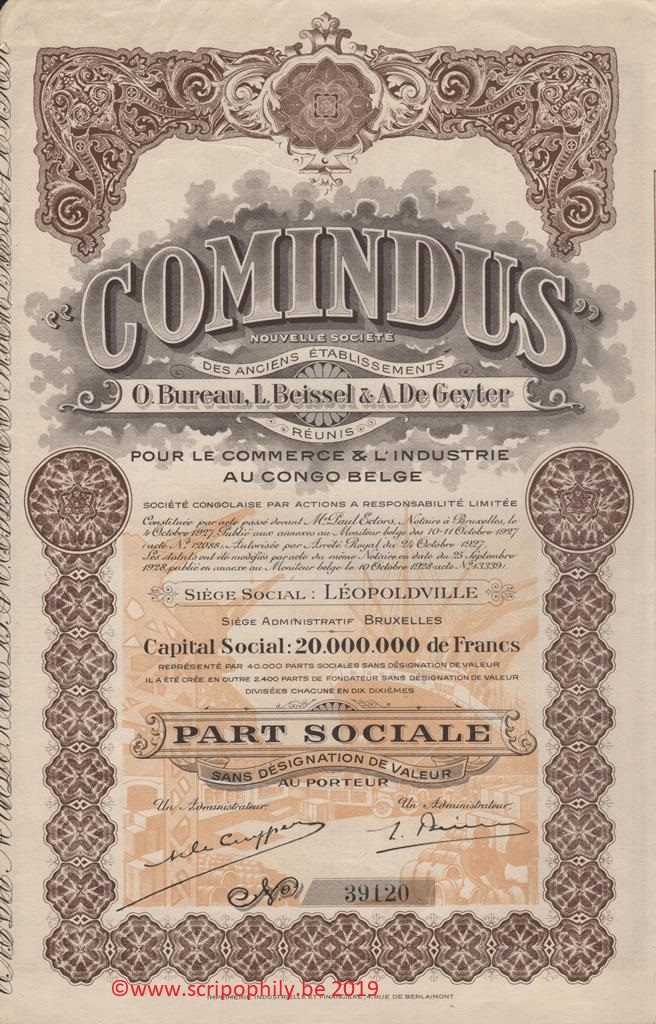COMINDUS
NOUVELLE SOCIETE DES ANCIENS ETABLISSEMENTS O. BUREAU, L. BEISSEL ET A. DE GEYTER REUNIS
POUR LE COMMERCE ET L'INDUSTRIE AU CONGO BELGE S.C.R.L.
Constitution
"Comindus", Nouvelle Société des Anciens Etablissements O. Bureau, L. Beissel et A. De Geyter, réunis pour le Commerce et l’Industrie au Congo Belge S.C.R.L. was established on October 4, 1927.
The head office was established in Leopoldville, the administrative office in Brussels
The capital was fixed at twelve million francs and was represented by 24,000 shares without value designation. In addition, 2,400 founder's shares without value designation were created. These shares could be divided each, at the expense of the holders, in ten denominations of one tenth.
Out of the 24,000 shares, 9,999 shares were distributed to the contributors and the 14,001 remaining shares were subscribed at the price of five hundred francs by:
Mr. Olivier Bureau, 5,014 shares; Mr. Auguste De Cuyper, 8,000 shares; Mr. Camille Ruelle, forty-five shares; The cooperative society Exportef, nine hundred shares; Mr. Achille Marchal, fifteen shares; Mr. Julien Bureau, fifteen shares; Mr. Jacques De Cuyper, twelve shares (30-(1927)-1004 to 1016).
Contribution(s)
Messrs. Olivier Bureau, Lucien Beissel and Aimé De Geyter declared that they would each individually and separately contribute to the presently constituted company the rights (being one third for each) belonging to them in their capacity as members of the Congolese limited liability company existing since December 10, 1925, under the name "Comindus", a company of the former establishments O. Bureau, L. Beissel and A. De Geyter for trade and industry in the Belgian Congo.
They also declared that the assets of the above-mentioned company included, among other things, buildings and land located in Leopoldville and purchase options on land also located in Leopoldville.
In remuneration of their contributions and of the steps, works, studies and diligences made by them to arrive at the constitution of the current company, it was allotted to each of the contributors, namely:
Messrs. Olivier Bureau, Lucien Beissel Aimé De Geyter 3.333 fully paid-up shares plus eight hundred founder's shares; a total of 9.999 shares and 2.400 founder's shares (30-(1927)-1004 to 1016).
First Board Directors
The first board of directors was composed of six members:
Messrs. Olivier Bureau, Aimé De Geyter, Lucien Beissel, Jules Denaeyer, Auguste De Cuyper, Achille Marchal.
And three commissioners.
Messrs. Camille Ruelle, André De Backer, Toussaint Mertens-Van Gossum (30-(1927)-1004 to 1016).
Object
Main object: trade in general, import and export of products and merchandise to the Belgian Congo and secondarily the agency and representation of firms, the sale of merchandise on consignment, participation in all commercial and industrial affairs, the creation of offices and counters in the Belgian Congo and the undertaking of all public and technical works, excluding any speculation.
To pursue the study and prospecting of concessions in Africa and particularly in the Belgian Congo, the obtaining, acquisition and exploitation of all concessions of the soil and subsoil, mines, quarries, etc., the development of the concessions by plantations and constructions, the transformation and manufacture of all articles necessary for trade and industry, in short all real estate, financial, industrial and agricultural operations likely to promote its corporate purpose.
To become interested by way of transfer, contribution, mergers, partnership, subscription of shares or in any other way with all individuals, companies, corporations, or associations, having a goal like its own or likely to promote its activity.
Both in Africa and abroad, to concede to companies the conclusion and execution of its operations of purchase, sale or exchange of manufactured products or raw materials, whether it is a question of foreign or domestic trade (30-(1927)-1004 to 1016).
Change of capital, event(s), participation(s), dividend(s), quotation
Notice. - Comindus was established in Leopoldville. In Léo, it owned a plot of land of about 3,500 square meters with three warehouses, one of which covered 1,100 square meters with the outbuildings, and the other two one hundred meters each. In addition, various plots of land where houses were erected.
The purchasing services in Europe were entrusted to a cooperative society, Exportef, which was set up to make important joint purchases for various companies and was controlled by Comindus.
However, Comindus had various representation monopolies: Etablissements Van der Borght, the firm Dekeyn, Peugeot et Cie (tools), etc. It had holdings in the Usines De Keyn company, Caéfa (Africaine d'Exploitation Forestière et Agricole), which it controlled, the French company Comindus, in Brazzaville (Anciens Etablissements Amouroux), which it also controlled, and Comindus-Katanga (Comkat), created to take over and develop the Elisabethville business.
Comindus specialized in various departments: a) industrial oils and greases; b) drugstores, colors, varnishes, and all articles for painting; c) general equipment and tools; d) building materials and hardware; e) general hardware; f) furnishings and complete house installations (21-(1928 T3)-1135 to 1137).
The year 1926 in the Congo was characterized by a continuous increase in sales prices due to the depreciation of the franc. Stabilization brought a complete reversal in these trends. Overheads rose, as the situation of the growing number of staff had to be seen in relation to the increasing cost of living.
The increase in sales, despite all the adverse circumstances, made it possible to overcome this difficult period and to realize, for the fiscal year 1927, a gross profit of 3,719,904 francs against 3,313,110 francs in 1926. Moreover, these results were obtained with the old capital of three million francs, the contributions of fresh capital having been placed at the disposal of the Company only at the end of the exercise. The results for the first half of 1928 show a serious improvement (21-(1928 T3)-1135 to 1137).
The EGM of September 25, 1928, increased the capital to twenty million francs by the creation of 16,000 new shares without designation of value, of which 4,000 (n° 24001 to 28,000) with dividend rights from January 1, 1928, and 12,000 (n° 28001 to 40,000) with dividend rights from January 1, 1929.
The 4.000 new shares, with dividend rights on January 1st, 1928, were allotted to the Société en commandite simple Magena (Magasins Généraux Africains, A. De Geyter et Co), having its head office in Leopoldville, against the contribution made by the latter of all its assets and liabilities, retroactively on December 31st, 1927.
The 12,000 remaining new shares, with dividend rights on January 1, 1929, were subscribed for by the Exportef Cooperative Society at the price of 550 francs per share, on the condition that it offered them for public subscription, fully paid up, to the owners of the old shares, at the price of 625 francs, during ten clear days before December 31, 1928, on an irreducible basis at the rate of 2 new shares per 3 old shares, and on a reducible basis also for the available balance (21-(1928 T3)-1135 to 1137).
18,000 shares numbered 6001 to 24,000 were quoted on the Brussels Stock Exchange since February 20, 1928 (21-(1928 T3)-1135 to 1137).
The year 1928 will see the development in the Congo of the commercial crisis that had begun to manifest itself in 1927. The specialties, its exclusive monopolies, the competence which must necessarily preside over the purchase of articles such as those sold by the Company were to put the latter in a privileged situation, even though the idling of many industrial exploitations had decreased. It hoped, thanks to the measures taken, to be able to get through this difficult period without having to resort to a new capital increase (21-(1929 T3)-1285)
The EGM of February 8, 1930, approved the draft contract to be signed with the Société en nom collectif O. Bureau et L. Beissel to transfer to the latter, for a maximum period of six years and under terms to be determined, its commercial service both in Belgium and in Africa, and especially in the Belgian Congo.
The Company paid a heavy price for the commercial crisis that began in the Congo three years ago and has only increased since then. It had to bear very heavy financial burdens to help its subsidiaries, which were not able to repay it, and these burdens caused cash flow difficulties. However, the Company owned land and buildings which, in the conditions in which they were built and, in the places, where they were located, were called upon to acquire a great surplus value soon.
The Company did not give up its commercial activity for the future, but it entrusted it temporarily to the Company 0. Bureau et L. Beissel, which had been in existence in Brussels since September 6, 1922; the latter will operate it at its own risk. The stocks (there are some 7 to 8 million) will be given in consignment to the said Company 0. Bureau et L. Beissel, which will thus be able to liquidate them under the most advantageous conditions for the Company, without the latter being obliged to enter new commitments.
The settlement of the Company's liabilities will lead to a gradual reduction of its expenses. In addition, the elimination of its sales department will enable it to reduce its overheads to a strict minimum; only the small costs of Europe and the maintenance of its buildings will remain essential. The collection of rents will make it possible to envisage the distribution of a dividend. Finally, as soon as the development of the Colony and the completion of the new railroads have brought back the inevitable prosperity of all Congolese enterprises (both commercial and agricultural), the Company will find its commercial department in a prosperous state, with a staff trained on the spot and capable of ensuring its activity, in the future, according to the methods which had ensured its success in the past (21-(1935 T1)-189).
On February 21, 1931, the capital was increased to twenty-three million francs by the creation of 7,000 new shares handed over, in remuneration of the contributions made, for the absorption of the Société Comindus-Katanga.
As Comindus-Katanga had eight hundred Comindus shares in its portfolio and Comindus-Katanga had 8,000 preference shares, 11,770 ordinary shares and 795 founder's shares in its portfolio, the merger of the two companies resulted in the immediate redemption of 3,572 Comindus shares by way of incorporation into the capital (21-(1935 T1)-189).


(21-(1937 T1)-537)
Bankruptcy
The Company was declared bankrupt on May 20, 1932, on its petition filed to prevent individual action by certain creditors. The Company obtained a composition agreement which came into effect on January 1, 1933.
The difficulties were caused by the elevated level of commitments made during a period of prosperity and by the deep and prolonged decline from which all economic activity in the Belgian Congo suffered.
The subsidiaries, the Traidiscom Company and the Caéfa Company, were both declared bankrupt, the latter since the end of the fiscal year.
The French Comindus in Brazzaville was slower to feel the effects of the crisis. At that time, it experienced serious difficulties, but which did not seem to be endangering it. The necessary measures were taken to cope with the situation and a fundamental reorganization was necessary.
The Comindus Company was kept in existence in the interest of the creditors, for whom the abandonment of the composition and the return to bankruptcy would be disadvantageous (21(1935 T1)-190) (21(1936 T1)-630).
More info later.



